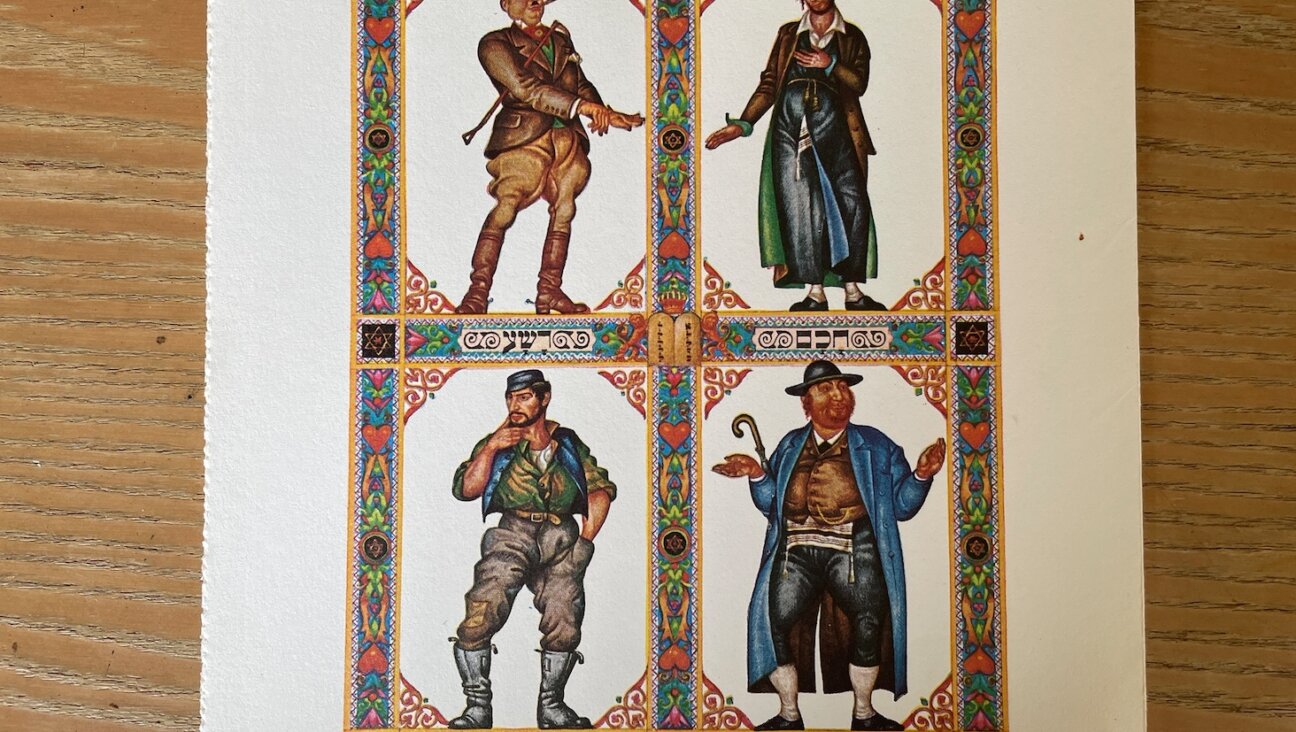A Good Guy To Know

Training Men: Derazhnia train station, made famous by Sholom Aleichem in the story ?The German,? is where the yid vos kotory may have alighted. Image by WIKI COMMONS
What would you say about a lifeguard who took nearly two-and-a-half years to answer a cry for help? Well, that’s me. Rummaging through a drawer of my desk the other day, I found this letter from Carolyn Shapiro of Washington, D.C., dated July 2, 2007:
“Worthy Philologos,
“Help! Help! I am a member of a Yiddish reading circle at the Washington JCC. We were reading Sholom Aleichem’s ‘Kasrilevker Nisrofim’ [“The Kasrilevke Fire Victims”], a story about a great fire in a small shtetl. One chapter deals with a delegation of Kasrilevke notables who travel to a big city to solicit relief money. On the train is a local know-it-all who gives them detailed instructions about what to do, enumerating all the city’s rich Jews and the exact order in which to visit them. In introducing this Jew, the narrator tells us: ‘In a word, he was the sort of person whom we call a yid vos kotori.’ The English translator of the story did not translate these words and simply footnoted them as ‘an idiomatic expression in the original.’ Of all the Yiddish dictionaries we consulted, only Alexander Harkavy’s listed this expression, but also without a definition. Can you tell us what it means literally and to what it alludes?”
I hope Ms. Shapiro and her circle found someone to enlighten them long ago. Yet, even if they no longer need me to come to the rescue, their question, for which I did not immediately have an answer, made me curious. Here, after thinking it over, is my take on it.
Kotory is a protean Russian pronoun that can mean either “who,” “which” or “that,” as well as, in certain idioms, “what,” “some,” “many a” or “how many.” As such, it is not unlike the Yiddish pronouns vos and velkher, which have a similar range of meanings. (Harkavy’s version of the expression, a mentsh katory velkher, has velkher instead of vos.) Conversely, it is unlike “who” or “which” in English, where “who” can refer only to a person and “which” only to an animal, inanimate object or abstract concept.
But let’s get back to Sholom Aleichem’s big-city know-it-all. (The city in question is Kiev, called Yehupetz in “The Kasrilevke Fire Victims,” as it is elsewhere in Sholom Aleichem’s fiction.) Here are excerpts from the narrator’s description of him:
“He [is the type of man who] always knows, if you follow me, to whom and how to talk about what. And talk he will about anything you want, so that you might almost think there’s nothing in the world he doesn’t know and no one in the world he’s not acquainted with. It’s a pleasure to travel with such a person in the same train…. Although he may be meeting you for the first time, he’s ready to do anything for you. Do you need a ticket from the ticket booth? Help in repacking your bags? He’ll be only too pleased!
“For our Kasrilevke passengers, this yid vos katori was, one might say, an oasis in the desert…. ‘You’re traveling, my dear Jews,’ he told them like a true father, while smiling and stroking his beard, ‘you’re traveling on a most important matter — one might say, a holy matter. I wish you every success, and I’m sure that, God willing, you’ll have it. Why, I’m as sure of it as I’m sure that today is Tuesday all over the world! The main thing, you should know, is getting into and out of the right places.’”
In the end, the yid vos kotory gets the Kasrilevke Jews out of a place that is definitely not the right one. Arrested and put in jail for innocently walking past the doorman into the home of Yehupetz’s richest tycoon, whose name is on the list the yid vos kotory has given them, they are released and showered with gold coins when their acquaintance from the train makes a telephone call to the tycoon and sets matters straight. Not knowing of his intervention, the Kasrilevke Jews are convinced that they have been saved by a divine miracle, and with that — well, almost with that, but I don’t want to give away the ending completely — Sholom Aleichem’s story comes to a close.
So what, you ask, is a yid vos kotory, or alternately, a mentsh kotory velkher? If we were to attempt a literal translation, combining the two pronouns together, the Yiddish one and the Russian one (it doesn’t really matter which comes first), this would come out as “a Jew [or man] who-that-which-what-who-that-which-what.” A freer translation might be, “A Jew [or man] who knows the who, that, which and what of everything.”
The moral, for those of you who long ago despaired of getting answers from me to your letters or e-mails, is to take heart. You never know what desk drawer I may rummage through next.
Questions for Philologos can be sent to [email protected].

I hope you appreciated this article. Before you go, I’d like to ask you to please support the Forward’s award-winning journalism this Passover.
In this age of misinformation, our work is needed like never before. We report on the news that matters most to American Jews, driven by truth, not ideology.
At a time when newsrooms are closing or cutting back, the Forward has removed its paywall. That means for the first time in our 126-year history, Forward journalism is free to everyone, everywhere. With an ongoing war, rising antisemitism, and a flood of disinformation that may affect the upcoming election, we believe that free and open access to Jewish journalism is imperative.
Readers like you make it all possible. Right now, we’re in the middle of our Passover Pledge Drive and we still need 300 people to step up and make a gift to sustain our trustworthy, independent journalism.
Make a gift of any size and become a Forward member today. You’ll support our mission to tell the American Jewish story fully and fairly.
— Rachel Fishman Feddersen, Publisher and CEO
Join our mission to tell the Jewish story fully and fairly.
Only 300 more gifts needed by April 30
























